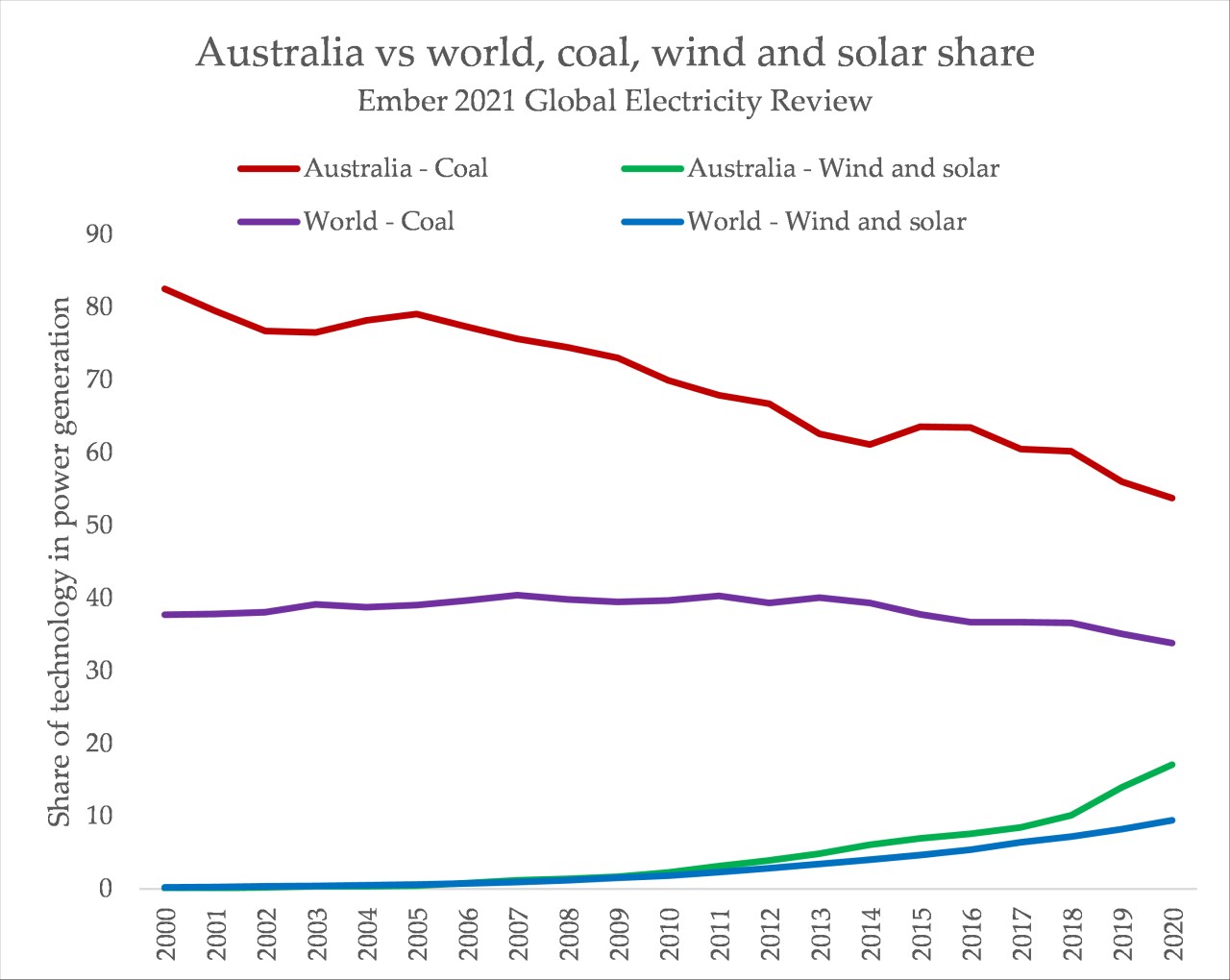The heat is on for Australia’s government to create a fabricated impression of climate success and sell that fabrication to the world to stave off criticism. Last month, there was a full-effort trial run of this process during the election campaign of Australia’s former finance minister and now new Secretary-General of the Economic Co-operation and Development (OECD), Mathias Cormann. That mostly involved painful contortions of Australia’s emissions data and climate targets, and it seems that it worked pretty well for Cormann.
US President Joe Biden, as I wrote this week, is very likely to announce a significant increase in their 2030 climate ambition – possibly, a doubling. Australia’s PM Scott Morrison is giving millimetres of movement on a 2050 target, but is absolutely certain to give no room whatsoever to a shift in Australia’s 2030 climate target.
In what seems like a pre-emptive move, the network of ambassadors and spokespeople of Australia’s government around the world seem to be posting more frequently about what they present as evidence of Australia’s ambition. It tends to centre on “technology”, more recently renewable energy and specifically solar.
In 2019, the share of wind 💨 & solar ☀️ in 🇦🇺’s electricity grids was more than DOUBLE the global 🌎 average & is projected to rise rapidly.
Talk about a power move!#ClimateAction @AusAmbEnviro pic.twitter.com/SiO1axGdqC
— Australia in the US 🇦🇺🇺🇸 (@AusintheUS) April 6, 2021
Transitioning to a cleaner, more efficient future is a priority for Australia. We are building & investing in renewable energies at record levels, including having the highest uptake of household solar in the 🌏. See more on our practical climate action ⬇️ pic.twitter.com/5A6gn5lVbN
— DFAT🇦🇺 (@dfat) April 7, 2021
The tone, which you can browse in this custom search query I’ve created here, is very significantly different to the domestic conversation. No one is saluting coal trains, here. The technologies are shiny, the tone is optimistic and the citations are not needed.
Australia is acting and innovating for climate action. An ageing coal-fired power station will become our nation’s largest-ever battery. It will store and redistribute growing renewable energy through our grid. @AusAmbEnviro @dfat https://t.co/kDPYgfwqsX
— Gregory Andrews (@AusAmbGHA) January 13, 2021
A lot of these numbers do indeed check out. Australia’s rooftop PV installations are, per person, easily the highest in the world, according the latest numbers. And Australia’s share of wind and solar are indeed double that of the world’s average. There are a few errors, too – Australia’s government predicts the country to reach 50% renewables by 2030, not 2025. And a few odd choices of imagery – the Neoen-Tesla Hornsdale battery was once derided as a ‘big banana’ by the current PM, but features in the video. And Boiling Cold author Pete Milne points out there’s a shot of the Gorgon carbon capture facility, a notoriously delayed project at a West Australian gas mine potentially facing fines for failure to capture sufficient carbon.
But the carefully crafted rosy numbers hide the true story. As analytics firm Ember shows, for the electricity sector, Australia’s high rate of renewable growth is rising off a very low base, and Australia has among the highest energy usage in the world. That means while ‘rate of growth’ and ‘per capita’ numbers look impressive, actual reductions in fossil fuels remain pretty measly, compared to global averages:
Things look even more dire for Australia when you compare it to other countries – and the world – based on total fossil share rather than just coal:
Renewable energy is well-loved, and it is not immediately obvious from those tweets that Australia’s current emissions trajectory is solidly off track in every single sector of the economy. Insufficient action in the power sector, and either an absence of action or fossil fuel subsidies for others mean Australia is it projected to miss its weak Paris 26-28% 2030 targets and it is way off a trajectory to hit a 1.5C compatible target of net zero by 2050 and around 66% reductions by 2030.
The situation continues to worsen, particularly in terms of reprogramming the vestigial climate and energy agencies of the Labor government into greenwashing exercises designed to protect the country’s fossil fuel industries. The Clean Energy Finance Corporation (CEFC), for instance, is facing a legislative push to adjust its mandate to allow it to provide loans to fossil fuel projects.
And on Friday, it was announced that the well-regarded Climate Change Authority (CCA) would be headed by former fossil fuel executive Grant King and head of the ‘greenhouse mafia’ (the Australian Industry Greenhouse Network) Susie Smith (also a former gas executive).
The government’s actions are both muddled and very clear. Those decisions, along with broader actions like the ‘technology investment roadmap’, seek to blend, confuse and intermix genuine efforts to reduce emissions with efforts to fund fossil fuel infrastructure and prolong the long, slow death of coal, gas and oil in Australia.
What seems incredibly likely is that the CCA will now embark on a similar task currently being taken up by fossil gas focused organisations like Santos, in which seemingly-ambitious climate targets are loudly announced, but often involve very little substantial action and a whole lot of fudging of numbers to avoid reducing the sale or burning of fossil fuels. There’s little doubt these efforts will feed into the broader international campaign to deflect real scrutiny of Australia’s serious climate failures, which seem to be worsening with each week.











